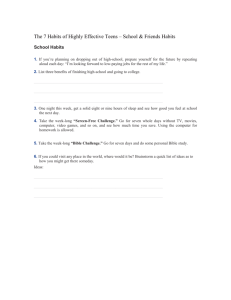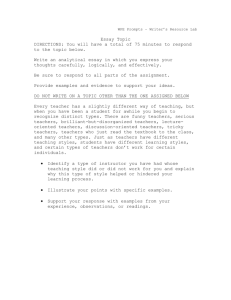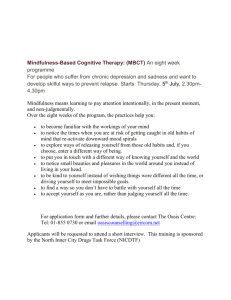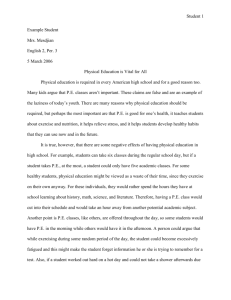English 9 - WordPress.com
advertisement
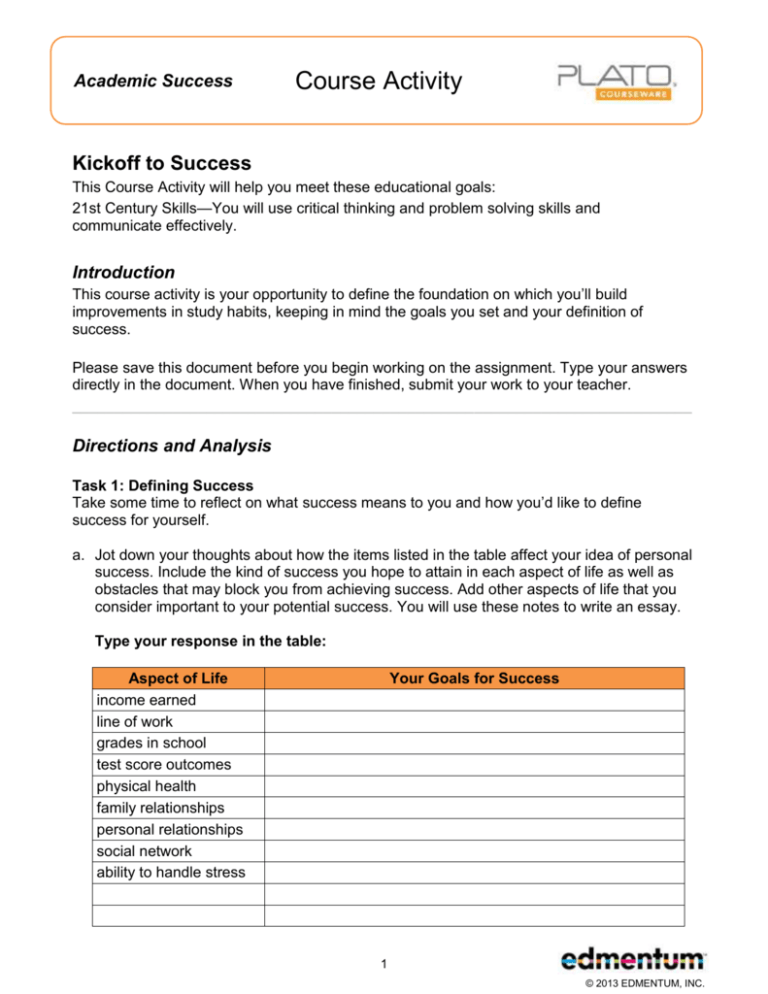
Academic Success Course Activity Kickoff to Success This Course Activity will help you meet these educational goals: 21st Century Skills—You will use critical thinking and problem solving skills and communicate effectively. Introduction This course activity is your opportunity to define the foundation on which you’ll build improvements in study habits, keeping in mind the goals you set and your definition of success. Please save this document before you begin working on the assignment. Type your answers directly in the document. When you have finished, submit your work to your teacher. __________________________________________________________________________ Directions and Analysis Task 1: Defining Success Take some time to reflect on what success means to you and how you’d like to define success for yourself. a. Jot down your thoughts about how the items listed in the table affect your idea of personal success. Include the kind of success you hope to attain in each aspect of life as well as obstacles that may block you from achieving success. Add other aspects of life that you consider important to your potential success. You will use these notes to write an essay. Type your response in the table: Aspect of Life income earned line of work grades in school test score outcomes physical health family relationships personal relationships social network ability to handle stress Your Goals for Success 1 © 2013 EDMENTUM, INC. b. Organize your thoughts about success by briefly answering the questions below. 1. Describe someone you think is successful in life and what makes that person successful. Type your response here: 2. Compare yourself to that person. Do you imagine becoming like that person, or do you see yourself heading down some other path? Type your response here: 3. Describe yourself five years from now if your life progresses ideally. Type your response here: 4. Describe yourself five years from now if you are only moderately successful in achieving your life goals. Type your response here: 5. Describe yourself five years from now if nothing works out as you would like it to. Type your response here: 6. Explain the aspects of success that seem realistically attainable in your life, as well as any that do not. Include a description of why you think these types of success are or are not achievable. Type your response here: 7. Think back on ways that you defined success in the past. How has it changed? What has remained the same? How do you imagine your notion of personal success will change in the future? Type your response here: 8. Explain the role you think education plays in reaching your goals. 2 Type your response here: 9. Describe the kinds of study habits you think you’ll need to develop to reach your goals. Type your response here: c. Write an informal essay in 4-5 paragraphs that describes how you define success, including the points listed below. The essay should synthesize the ideas you explored in sections a and b. (This is an informal essay in the sense that you will talk about yourself rather than an external, researched topic. But your essay should have the same necessary coherence and readability of any essay you share with others.) Include a wide range of “aspects of life” that are important to your current or future success. Reflect on any obstacles you perceive are keeping you from attaining success in some aspects of life. Type your response here: Task 2: Current Study Habits This analysis will help you determine where you stand with your current approach to studying. a. Describe your study habits in terms of each category listed below. Add other categories as needed. Type your response in the table: Category of Study Habit Describe the circumstances in which you study and what you do when you study. How do you take notes to record the content of your classes? How do you prepare for tests? How and how well do you manage your study time and anticipate deadlines? How do you balance your social life and your study time? Description 3 b. Now answer these questions, in 3-4 sentences, about how effective you think your study habits are. 1. How satisfied are you with the results of your current study habits? Explain. Type your response here: 2. What qualities about your study habits do you think you could improve? Explain why they need improvement and what about them should change. Type your response here: Task 3: Learning Styles Think about the classes you currently take and those you’ve taken in the past. Consider the ways in which you preferred to learn. a. Answer the multiple-choice questions below. Choose the first answer that comes to mind and highlight it with the highlighting tool; don’t spend too much time thinking about a certain question. When you are done, score each answer with the provided rubric and determine what type of learner you are. Read the descriptions of your learning style as well as the others. Question 1. Where do you tend to sit in class? 2. What do you do when you get bored? 3. Which statement do you most identify with? 4. When someone is speaking, what do you pay attention to most? 5. What type of class do you benefit from most? Answers a. b. c. a. b. c. a. b. c. a. b. c. a. b. c. 4 in the front wherever I can hear near the door or an open space I read something. I hum or talk. I take a walk. I like to see what I’m learning. I tend to read aloud when learning. I enjoy tasks that involve manipulating materials. language that is rich in imagery whether or not you can hear clearly what the person is doing while speaking a class that uses images and diagrams a class that emphasizes class discussion a class that has activities and hands-on lessons 6. How do you usually study for a test? a. I look over my notes and study illustrations. b. I read my notes aloud and have someone quiz me. c. I write things out and make diagrams. 7. When in class, what do you usually a. take a lot of detailed notes do? b. record the lecture and listen intently c. rely on activities such as labs and experiments 8. What type of class would you prefer a. an art class to attend? b. a music class c. an exercise class 9. Which activity would you rather do? a. write a story b. listen to a story c. act out a story 10. How do you prefer to solve a a. by making a list of steps and checking them problem? off as they are accomplished b. by talking things out with others c. by jumping in and seeing what happens Total your a, b, and c responses and put the totals in the spaces below: a___________ b___________ c___________ If you had more “a” responses, your preferred learning style is visual: Visual Learners learn best when information is presented in a written language format or in another visual format such as pictures or diagrams. Most likely, you prefer classes in which teachers write on the board, provide handouts, and use slideshow presentations; remember information by creating pictures in your mind; take detailed notes in class and from your textbooks; like to see what you are learning; and are attracted to written or spoken language with vivid imagery. If you had more “b” responses, your preferred learning style is auditory: Auditory Learners learn best when information is presented in an auditory language format. Most likely, you prefer classes that emphasize teacher lectures and class discussions; like listening to audio tapes; find yourself reading aloud or talking things out to gain a better understanding; remember information by verbalizing it to yourself; like to be quizzed by a friend; and need to hear what is being said but don’t need to see anything. 5 If you had more “c” responses, your preferred learning style is tactile/kinesthetic: Tactile/Kinesthetic Learners learn best in hands-on learning settings in which they can physically manipulate something to learn about it. Most likely, you prefer classes where you can move around and handle objects; tend to do well in classes that have a lab component; need to have an actual object in your hand but don’t need to see a picture of it or hear a description; are active and take frequent breaks; speak with your hands and many gestures; and tend to remember what was done but maybe not what was said or seen. b. Compare some classes you’ve had and styles of learning they fostered by answering these questions. 1. Think of two classes you are taking now or have taken in the past, one in which you felt the most comfortable learning new knowledge and one in which you found it difficult to absorb new knowledge. Describe each class in terms of the subject matter, the textbooks or other materials used, the kinds of interaction you engaged in (lecture, lab work, group discussions, etc.), how the instructor taught each class, and anything else that might help explain why you found one class comfortable and the other highly challenging. Type your response here: 2. Describe the aspects of your personal learning style that might have contributed to your experience in these two classes. Type your response here: 6 Evaluation Your teacher will use this rubric to evaluate the completeness of your work as well as the clarity of your thinking. Task 1: Defining Success Distinguished (4 points) Criteria Thoughts expressed about success are detailed and show evidence of some deep reflection. Essay presents a coherent picture of the student’s relationship to success at this point, including obstacles. Proficient (3 points) Thoughts expressed about success are adequately detailed and show evidence of some reflection. Essay presents a coherent picture of the student’s relationship to success at this point, with some mention of obstacles. Developing (2 points) Thoughts expressed about success are moderately detailed and show evidence of little reflection. Essay presents a comprehensible picture of the student’s relationship to success at this point but may not be well organized. Beginning (1 point) Thoughts expressed about success are disjointed and don’t show evidence of reflection. Essay presents an incoherent picture of the student’s relationship to success at this point. 7 Task 2: Current Study Habits Beginning (1 point) Developing (2 points) Proficient (3 points) Distinguished (4 points) Criteria Thoroughly describes study habits in engaging detail. Insightfully diagnoses effectiveness of study habits and proposes areas that would benefit from improvement. Describes study habits in some detail. Diagnoses effectiveness of study habits and proposes areas that would benefit from improvement. Describes study habits in minimal detail. Vaguely diagnoses effectiveness of study habits and proposes areas that would benefit from improvement. Describes study habits in a way that is confusing or hard to follow. Does not diagnose effectiveness of study habits or propose areas that would benefit from improvement. 8 Task 3: Learning Styles Beginning (1 point) Developing (2 points) Proficient (3 points) Distinguished (4 points) Criteria Reflects thoughtfully on his or her learning patterns. Draws thorough and thoughtful conclusions about how learning styles and modes of education affect his or her ability to learn. Reflects somewhat thoughtfully on his or her learning patterns. Draws fairly thoughtful conclusions about how learning styles and modes of education affect his or her ability to learn. Reflects adequately on his or her learning patterns. Draws some conclusions about how learning styles and modes of education affect his or her ability to learn. Reflects sketchily on his or her learning patterns. Draws vague conclusions about how learning styles and modes of education affect his or her ability to learn. 9
